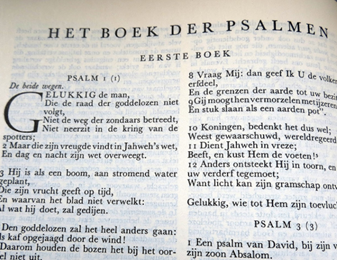not 66 Bible books!
15-12-2011 - Posted by MarlijneIn the preceding blog, I explained that not our “Old Testament”, but the Tanakh shows the correct arrangement of the Hebrew Bible. Below, are presented the three divisions and the order of the books in the Tanakh, showing both the Hebrew and the common name:
- Beres’jiet – Genesis
- Sjemot – Exodus
- Wajikra – Leviticus
- Bemidbar (Bamidbar) – Numbers
- Devariem – Deuteronomy
- Jehosjoea – Joshua
- Sjofetiem – Judges
- Sjemoeël 1 – I Samuel
- Sjemoeël 2 – II Samuel
- Melachiem 1 – I Kings
- Melachiem 2 – II Kings
- Jesja‘jahoe – Isaiah
- Jirmejahoe – Jeremiah
- Jechezkel – Ezekiel
- Hosjea‘ – Hosea
- Joël – Joel
- Amos – Amos
- ‘Ovadja – Obadiah
- Jona – Jonah
- Micha – Micah
- Nachoem – Nahum
- Chavakoek – Habakkuk
- Tsefanja – Zephaniah
- Chaggai – Haggai
- Zecharja – Zechariah
- Mal’achi – Malachi
- Tehiliem 1 – Psalms
- Misjlee – Proverbs
- Iov – Job
- Sjier Hasjiriem – Song of Solomon
- Roet – Ruth
- Echa – Lamentations
- Kohelet – Ecclesiastes
- Ester – Esther
- Daniël – Daniel
- Ezra – Ezra
- Nechemja – Nehemiah
- Divree Hajamiem 1 – I Chronicles
- Divree Hajamiem 2 – II Chronicles
how do we count the books?
The above enumeration of the books is common in reference works, but is, nevertheless, disputed. Of old, the Jews counted the books of the Tanakh as twenty-two books. Flavius Josephus wrote already about this. At this figure they arrived by counting the twelve minor prophets as one book, and the double parts of Samuel, Kings and Chronicles as single books. On this number one came from, by the twelve minor prophets to count as a single book and, for example, the double parts of Samuel, Kings and Chronicles also if some books. Twenty-two books in the Hebrew Bible is a significant number, because it corresponds with the number of letters of the Hebrew alphabet. Do we add to this the twenty-seven books of the Greek Bible (New Testament), we arrive at a total of forty-nine “sacred scriptures”. Seven times seven, which is the fullness, squared!
five books of the Psalms
One could argue that the old, Jewish enumeration is forced to let it correspond to the number of Hebrew letters. Do we let go of this count for that reason, and we follow the usual count, then we arrive at the well-known thirty-nine books. But … this is not a demonstrably true count, because it ignores four books. The Psalms should not be counted as one book, but as five books. Just read the inscription above Psalm 1, 42, 72, 89 and 106. The one hundred and fifty Psalms are divided into five books, which, incidentally, again matches the consecutive, five books of Moses. This again emphasizes that all the Scriptures are interrelated and display an underlying structure and design.
not 66 but 70 books!
Do we count the Psalms, indeed, as five books, then it means that the Tanakh does not contain thirty-nine, but forty-three books. Certainly, this is a meaningless number… but it’s not finished. When we add to this the 27 complementary books of the Greek Bible, then we arrive at a total of seventy books! This is different from the well-known sixty-six books, which is a typical, human number (just think of 666…). The number seventy is a multiple of seven, symbolizes fullness. Moreover, the number seventy, traditionally, refers to the nations of the world. The list of nations of Genesis 10 shows seventy sons as descendants of Noah. God’s Word for the nations of the world is complete… seventy books!

 English Blog
English Blog